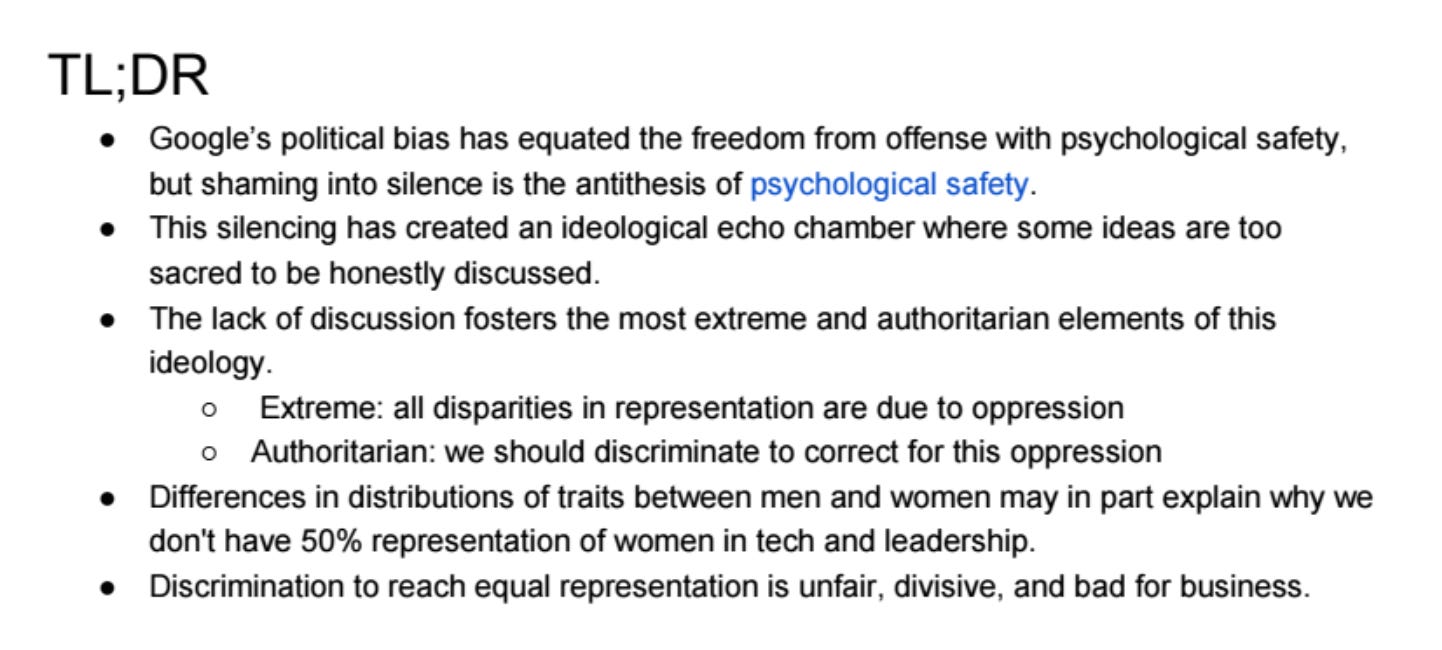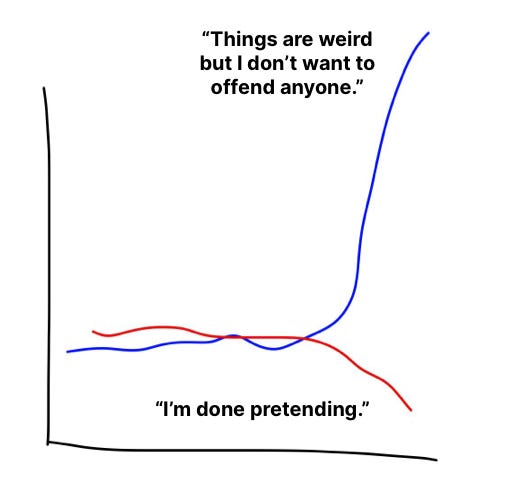When you can assume that your audience holds the same beliefs you do, you can relax a little and use more normal means of talking to it; when you have to assume that it does not, then you have to make your vision apparent by shock—to the hard of hearing you shout, and for the almost-blind you draw large and startling figures. - Flannery O’Connor, Mystery and Manners
A few years ago, a software engineer at Google named James Damore published an internal memo—in response to a mandatory diversity training program he attended—titled “Google’s Ideological Echo Chamber”.
Damore, by all conceivable metrics the kind of competent, curious engineer that tech companies pay mountains of money to retain, made the unforgivable mistake of essentially asking: “Hey, what if Reality—and not targeted misogyny—accounts for the fact that more men than women work in tech? Also, why does it feel like I could get fired for asking this?”
He was, of course, fired less than three months later for “[advancing] incorrect assumptions about gender” and for raising a perspective that “is not a viewpoint that I or this company endorses, promotes, or encourages,”1 said Danielle Browne, Google’s VP of Diversity, Integrity, and Governance.
What struck me the most in revisiting his story is that this happened at the end of 2017. In my mind, this was something that happened circa 2012—at least or nearly a decade ago, with enough time for the Overton Window to collapse to the point where this kind of discussion is now ubiquitous on X and in other places.
Had he waited for the Vibe Shift, Damore could have posted the above tl;dr to a receptive audience of tens of millions:
It’s hard to say exactly how long it’s taken for the eponymous vibe to shift, but everyone knows it’s happening. For at least the last six months, not a day has gone by when I haven’t seen something, heard a statement, read a post, or had a conversation with someone that doesn’t leave me completely shocked—in a good way.
“This would not have happened a year ago. Vibe shift.”
The Vibe Shift I’m talking about is the speaking of previously unspeakable truths, the noticing of previously suppressed facts. I’m talking about the give you feel when the walls of Propaganda and Bureaucracy start to move as you push; the very visible dust kicked up in the air as Experts and Fact Checkers scramble to hold on to decaying institutions; the cautious but electric rush of energy when dictatorial edifices designed to stifle innovation, enterprise, and thought are exposed or toppled.
Fundamentally, the Vibe Shift is a return to—a championing of—Reality, a rejection of the bureaucratic, the cowardly, the guilt-driven; a return to greatness, courage, and joyous ambition.
It is best exemplified by this meme I made in my viral response against Paul Graham’s explanation for why young men are overwhelmingly more conservative and young women overwhelmingly more liberal. When he argued that this trend has a “boringly obvious” explanation (basically “boys and girls don’t spend as much time together anymore”), I took a different approach:
As a society, is much easier to be detached from reality if you’re sloshing around the SaaS casino of the 2010s, where things are easy and you can generate life-changing money by shipping the 10th notetaking app of the year or posting on Instagram. It’s much safer to keep your mouth shut about The Current Thing—no matter how insane—if the alternative is to have your life destroyed.
But we do not live in either easy or safe times, and as the cultural, technical, and political stakes get higher, a stoical “just keep your mouth shut” attitude—surprise!—just doesn’t cut it.
As Isaiah Berlin writes,
“This [a cowardly retreat towards the inward] is certainly what happened in Ancient Greece when Alexander the Great began to destroy the city-States, and the Stoics and the Epicureans began to preach a new morality of personal salvation, which took the form of saying that politics was unimportant, civil life was unimportant, all the great ideals held up by Pericles and by Demosthenes, by Plato and Aristotle, were trivial and as nothing before the imperative need for personal individual salvation.”2
Most folks in the tech and venture orbits are probably aware of the most salient example of the vibe shift in startups: the happenings in The Gundo. The tl;dr on the Gundo is a bunch of bright, young, ultra-ambitious dudes in El Segundo, CA have forsaken the “don’t rock the boat by saying what you believe and focus on hitting the SaaS jackpot” ethos of 2010-2020s Silicon Valley and are instead unapologetically pro-America, pro-family values, openly religious, all of which they channel into challenging and important missions like manufacturing hydrocarbons out of thin air, making it rain where it doesn't, and more generally “rebuilding America.”
But part of what is causing the Vibe Shift is that it goes well beyond the Gundo: indeed, no matter what circles you run in, almost everyone—from AI accelerationists to techbros to gun owners to Bitcoiners to Christians to normal families to children who like math to American citizens—is undergoing a variation of the same kind of pressure to conform, stagnate, decelerate.
Not only does the Current Thing demand total and unquestioning loyalty from all of these groups, but not even a year and a half ago anyone willing to speak out could be barred from participating in the public square, forever.
And then, Elon freed the bird.
As Mike Solana recently wrote,
“For over twenty years it’s been obvious the internet doomed the 20th Century media oligopoly. But it took decades for a majority of Americans to move online, and in 2016, at precisely the moment it seemed social media would replace the former order, an unofficial alliance of powers refortified an elitist hold on discourse. A year ago, Elon shattered that alliance. The thought criminals were freed, and the window of acceptable discourse broadened until it broke — a total Overton collapse. Now, for better and for worse, there is no more curation, there are no more fake trends, there are no more Washington Post-employed state sock puppets propped up artificially, and there is no more political censorship. Yes, whatever Elon finds personally annoying tends to vanish (R.I.P. Substack links), and he’s still not been tested by a major election. But, for now at least, news trends are dominated by stories people actually care about (even when they suck). This has never happened before, and so the phenomenon necessarily poses opportunity that has never before existed.” [emphasis mine].
It is hard to overstate how much Elon’s purchase of Twitter has accelerated (and perhaps directly caused) the Vibe Shift. The old ways of cutting and slicing the world have broken down, and now the most unexpected groups have found themselves as co-belligerents in an existential war to preserve our ability to speak, compute, build, worship, transact, and live in peace.
And thus—cutting across communities and denominations and occupations and hobbies—we get to the Vibe Shift:
The Vibe Shift looks like ditching childless civilizational nihilism and saying, yeah, having kids is good, actually.
The Vibe Shift is the repudiation of homogenizing hyperglobalism and instead intentionally pursuing the communal, the local, and the national.
The Vibe Shift is the rejection of reality denial and instead embracing that men and women are unique and different.
The Vibe Shift is the refusal to subordinate yourself and your family to the whims and anxieties of activists and bureaucrats and relearning to trust your eyes and ears.
The Vibe Shift is the rejection of secular liberal materialism and a return to the Christian foundations of the West.
The Vibe Shift is taking off the ironic veil that aims to cover the festering wounds of despair and putting on the vestments of seriousness instead.
The Vibe Shift is laughing at those trying to demonize men and cheerfully proclaiming “Dudes rock.”
The Vibe Shift is spurning the fake and therapeutic and reclaiming the authentic and concrete.
The Vibe Shift is a healthy suspicion of credentialism and a return to human judgment.
The Vibe Shift is living not by lies, and instead speaking the truth—whatever the cost.
The Vibe Shift is directly facing our tumultuous times, refusing to blackpill, and choosing to build instead.
There is no denying that whatever else, the Vibe Shift is an electric time—after all, things hidden before the foundation of the world are being rediscovered, and things thought to last until the end of time are crumbling at hypersonic speeds.
It is also a time fraught with opportunities for new, disruptive technology. It doesn’t surprise me that as we enter what could very well be the most volatile political and cultural period in recent American history we’re also seeing some of the boldest bets of the last few decades. The printing press emerged—as if by chance—amid the most apocalyptic geopolitical and cultural rearrangement of Europe since the Great Schism of 1054. In a time charged with explosive tension and excuses for violent conflict, a new technology gave the Reformers a strategic, non-coercive lever against the status quo, with various historians almost singlehandedly crediting the success of the Protestant Reformation to such a device. Closer to home, the age of American Westward expansion accelerated with the aid of technologies that the frontier itself inspired: from 1830 to 1895, the photograph, the telegraph, the rotary power printer, the typewriter, the transatlantic cable, the telephone, the motion picture wireless signals, and other now-ubiquitous technologies emerged to help advance civilization past a kind of topographic-political gridlock and into a new era of possibility and abundance.3
Fundamentally, the Vibe Shift is a time for real courage. Like Tim O’Brien’s main character in “On the Rainy River,” we’ve indulged in cowardice for too long:
“All of us, I suppose, like to believe that in a moral emergency we will behave like the heroes of our youth, bravely and forthrightly, without thought of personal loss or discredit. Certainly that was my conviction back in the summer of 1968. […] If the stakes ever became high enough—if the evil were evil enough, if the good were good enough—I would simply tap a secret reservoir of courage that had been accumulating inside me over the years. Courage, I seemed to think, comes to us in finite quantities, like an inheritance, and by being frugal and stashing it away and letting it earn interest, we steadily increase our moral capital in preparation for that day when the account must be drawn down. It was a comforting theory. It dispensed with all those bothersome little acts of daily courage; it offered hope and grace to the repetitive coward; it justified the past while amortizing the future.”4
Whether through self-immolation or disruption from technologies like AI, the old world of Ivy League diplomas and a carefully curated “color inside the lines” public image is passing away. In the new world, things like courage—things that cannot be faked, things that are really real—are, perhaps for a moment, “proof of credibility” for those who are actively and explicitly building amid our decline and eager to leave a better future for our children’s children.
How long this Vibe Shift lasts remains to be seen. It may be fleeting, though I hope it sticks around. However long it lasts, we must steward it. And so I leave you with the words of Nehemiah to the Israelites, as they faced opposition and threats from surrounding adversaries who sought to deter them from rebuilding the walls of Jerusalem:
“And I looked, and rose up, and said unto the nobles, and to the rulers, and to the rest of the people, Be not ye afraid of them: remember the Lord, which is great and terrible, and fight for your brethren, your sons, and your daughters, your wives, and your houses.”
— Santiago Pliego
https://arstechnica.com/tech-policy/2017/08/google-fires-engineer-who-crossed-the-line-with-diversity-memo/
Isaiah Berlin, “The Roots of Romanticism,” 1965.
Neil Postman, “Technopoly,” 1992.
Tim O’Brien, “On The Rainy River,” in “The Things They Carried”, 1990.








I caught your interview with Tucker this morning then immediately read your post. Brilliant. As a Boomer and a Christian wife, mom, grandmother and business owner, I'm smiling today knowing that there are young brave men out there willing to fight for truth. Thanks! (From a small town in KY)
I also arrived via Carlson's interview. While Twitter freedom did mark change in discourse, many of us had been drawn to SubStack as a result of the excesses of the pandemic. Huge numbers then found the platform where alternate theories could be debated among the like minded and we were not drowned out nor cancelled for thinking masks and other mitigation actions were failing. It didn't help that media was going on daily with dire warnings which were beyond silly stoking fear in way too many - needless fear.
So the dam broke when the public, at large, refused the boosters. They were discarding fear and were questioning the media dogma because they could observe for themselves. And the voices within SubStack had become public knowledge.
I can see the valiant effort on X to push J6 as a way to discredit Trump, but I suspect many now question the government's overreach. We do seem at a turning point where we are beginning to really distrust much of what the media is saying - perhaps because they repeatedly are found in error.
We see Carlson't large audience and many tuning into alternative media, like NewsNation, for other opinions. While Fox News remains king, others are failing to reach an audience. We are quite willing now to be contrarian in our views and not worry so much about the nonsense among the foolish young on campus. Hopefully this is a trend back to some cultural norm where we are comfortable thinking for ourselves.